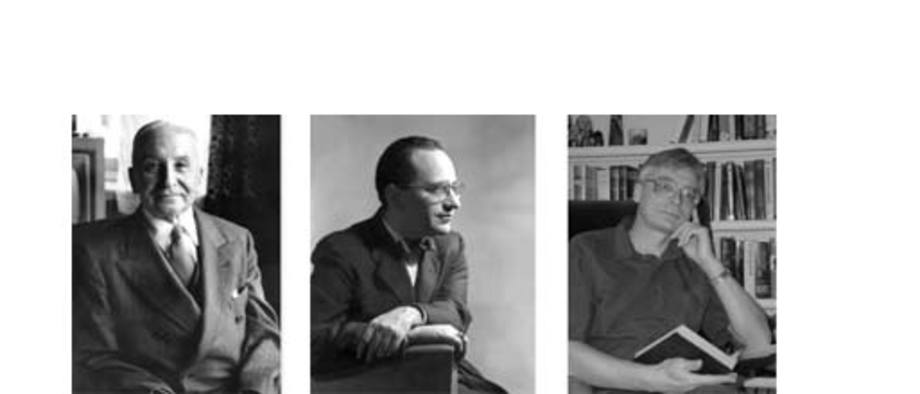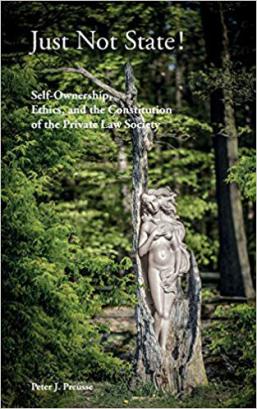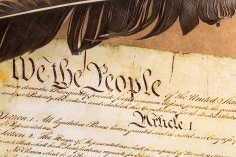Just Not State! Self-Ownership, Ethics, and the Constitution of the Private Law Society
In this concise work of social philosophy, the author not only argues that, according to the well-established School of Austrian Economics and Ethics, any form of domination and coercive rule is illegitimate; he also consolidates and restates ethics of self-ownership and ownership by introducing something so far neglected: an explicit axiom of the ‘equal human rank’ as a valuator. Furthermore, he enables confidence in the feasibility of a peaceful, lasting and flourishing stateless society by introducing a novel concept for a draft constitution, which combines all legitimate aspects of equality and full sovereignty of the individual’s encompassing property rights. The key issue here is the constitutional preclusion of any permanent and autonomous public sector.
Review by Gerard Casey, Professor emeritus, Philosophy, Dublin, Ireland:
Dr Preusse is to be congratulated for attempting to do in the first part of his compact book, Just not State!, what, to my knowledge, has never been done and that is to provide a coherent and plausible account of the foundations of praxeology as articulated in the writings of Ludwig von Mises, Murray Rothbard, Hans-Hermann Hoppe and Antony de Jasay. This is a project I once thought of attempting myself and I made some small beginnings in that direction but, in the end, I was not able to see my way through the thickets of complications. I cannot say that Dr Preusse has succeeded—in the end, it may not be possible to reconcile the accounts of these thinkers—but I can say that he has made the most comprehensive effort that I know of so to do. Apart from his pioneering work on this most difficult, if somewhat recondite, of topics, Dr Preusse develops the notions of ownership and self-ownership as a replacement for the much-abused notion of freedom and provides a schema for a constitution for a private law society.
Book review:Just Not State!
Review by Robert Grözinger, equity & freedom, 17 Sept. 2018:
A body of thought which claims to have the most far-reaching consequences, such as that of the Austrian School of Economics and Ethics, requires foundations that are as solid as possible. Peter J. Preusse, a newcomer to philosophy, has written a book, now also available in English, in which he expressly attempts to isolate the inner logical structure of Austrianism and present something that has probably not been attempted before, despite the explicit claim of Austrianism to be an axiomatic-deductive system. Preusse, who is German, reconciles the claims of final justification from the fact of Ludwig von Mises’ concept of action and from Hans-Hermann Hoppe’s a priori of argumentation and then expands Austrian theory by introducing the axiom of human rank, which conceptually determines the hitherto neglected element of equality among humans.
Unfortunately, there is continued confusion especially around the basic terms ‘ethics’ and ‘morality,’ which are important for social philosophy. Preusse clearly separates the spheres of a group-related code of conduct on the one hand and, on the other, the property norm as the only possible interpersonal conflict avoidance strategy in view of scarcity. In general, and also in specialist, language, both spheres are described sometimes as ethics, sometimes as morals. Following Schopenhauer, Preusse makes the distinction between ‘harm nobody’ as the core of ethics, namely as an expression of the ethics of duty or law on the one hand, and the aspiration ‘give help to the best of one's ability’ as ethics of love or rather morality, which has a limited scope and discriminatory power. In addition, there is cognitive ethics: ‘Consecrating life to truth.’
Preusse shows that there is a fundamental difference between alienable and inalienable property, i.e. of goods and contractual rights on the one hand, and of one's own lifetime and freedom of will on the other. From this difference it follows that a private law society, a society constituted without a state, must find a way to deal with conflicts in the area of self-ownership. Laudably, the author presents the reader with a draft constitution that attempts to tackle these conflicts. An almost practical political result at the end of an otherwise rather theoretical work.




